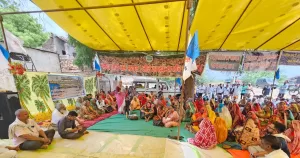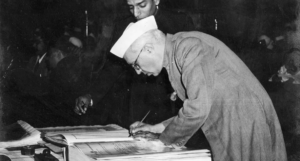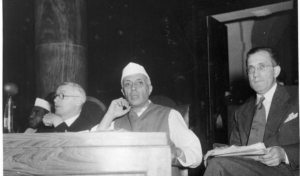Elaben Bhatt, Labour Organiser and Gandhian, Passes Away
❈ ❈ ❈
Elaben Bhatt, Labour Organiser and Gandhian Who Helped Working Women Fight for their Rights
Harish Khare
Ela Ramesh Bhatt, popularly known as Elaben, was the most authentic Gujarati the state had seen in its public life in last five decades. Though deeply rooted in the traditional status quoist social order, she came to personify Gujarat’s finest impulses – an unwillingness to come to terms with the conformist orthodoxy of the day and an unafraid imagination to connect with global currents.
Of course, Elaben Bhatt, who died in Ahmedabad on November 2 at the age of 89, is best known as the founder of the Self-Employed Women’s Association (SEWA), a trade union that works amongst more than a million low income, self-employed working women.
SEWA today is a movement, widely recognised and respected at home and abroad. It was only natural that she should have received almost every conceivable honour, award and honorary degrees, including from Harvard and Yale.
But 50 years ago, when Elaben began talking of gender justice, women’s empowerment, self-help, unionisation of poor and marginal and unrecognised women and the power of collective bargaining, she was swimming against the current. She headed the women’s wing of Majoor Mahajan Sangh – the Textile Labour Association founded by Anasuya Sarabhai and Mahatma Gandhi – but could not make the old and compromised men who bossed over the TLA understand and recognise the contribution women made to the household and to the society and its economy. She had the courage of conviction to walk out of the TLA and set up a separate women’s union, separate co-operatives and an unheard of women’s bank. And, the rest is history.
Elaben was an unflamboyant feminist. Under her gentle guidance, SEWA tried to emulate Gandhi’s Ashram code of simple living, khadi, morning prayers, communal harmony – in addition to the ethos and etiquettes of sisterhood. Elaben herself was at her most relaxed and joyful self when she was in the company of ordinary SEWA members. Under her moral leadership, SEWA became a model for women’s empowerment.
Elaben ensured the women organisers and activists of SEWA got trained in the art of collective bargaining, the agency of self-help and understood the utility of national and global networking. The gains secured for women were no doubt modest and incremental but made a very consequential difference to the poor women’s lives, dignity and self-respect.
Her modest home in Panchsheel Society in Ahmedabad became the pilgrimage centre for activists, unionists and organisers at home and abroad. Over modest meals, serious and sober discussions got held about what policies, laws and practices needed to be tweaked to make women’s lives a fairer proposition. The SEWA experiment became a template for policy-makers all over the world.
Elaben Bhatt could become the catalyst for a hugely impressive transformation in the way women are perceived and treated by policy-makers and administrators because she steadfastly refused to be sucked into the partisan quarrels of politicians. In these increasingly bitter times, this refusal was often misunderstood as timidity, even a moral failing. But she remained convinced that if the “sisterhood” of poor women could be firewalled against the communal virus, then there would be hope for sanity and harmony.
In fact, if Elaben could imagine a movement like SEWA it was because the 1970s and 1980s were the times when civil society was the prime site of social and intellectual vibrancy. Ahmedabad was dotted with islands of excellence and innovation and entrepreneurship – the Indian Institute of Management and National Institute of Design, the National Physical Laboratory and ISRO, and of course the Sabarmati Ashram, Gujarat Vidyapeeth and TLA. SEWA fitted naturally in this ambience of non-dependence on the Gandhinagar babus. The Ahmedabad model got replicated in many parts of the country, turning Elaben into an iconic figure for thousands and thousands of ordinary women across India.
Today, of course, Gujarat stands transformed as civil society has been marginalised into near non-existence by the maximalist politicians who seek to control and calibrate every aspect of the state’s collective life. That SEWA continues to thrive is a tribute to the soundness of Elaben’s inspired understanding of the role of women in the Indian household and economy.
Till her last weeks, Elaben, frail and feeble, remained concerned about the future of Gandhian values and institutions. Her departure leaves Gujarat a much poorer place.
(Courtesy: The Wire.)
❈ ❈ ❈
Ela Bhatt, Aged 90, a Doyen in Organisation of Working Women, Passes Away
Sabrang India
Ela Bhatt, founder of the Self Employed Women’s Association (SEWA), Ela Bhatt passed away on Wednesday, November 2, at the age of 90. Elaben Bhatt was the chairperson of Sabarmati Ashram Trust and until recently, for seven years, chancellor of the Gujarat Vidyapith. She had recently expressed her desire to step down due to failing health. The Vidyapith, over a 100 years old, was founded by Mahatma Gandhi and he himself had been first chancellor.
Bhatt was chosen after former chancellor, late Narayan Desai, son of Mahadev Desai who was Bapu’s personal secretary, had resigned on January 27, 2015, citing failing health. A search committee was constituted immediately. A few months later, in the March of that year, Desai died at the age of 90.
Usually, the post of Vidyapith chancellor is traditionally held for life. Soon after Desai’s death, Bhatt was unanimously chosen to lead Vidyapith on March 7, 2015. Back then, Bhatt had told TOI that she had accepted the position as she regarded it as her ‘kartavya’.
“Education was central to Gandhiji’s vision, an important means towards swaraj,” Bhatt had said back then. “It is worth recalling here that soon after Narayanbhai resigned in January 2015, the trustees had offered Mahatma’s grandson Gopalkrishna Gandhi, the chancellorship, a position he had declined. Narayanbhai had then suggested Ela Bhatt’s name before he died,” added the senior trustee. The Vidyapeeth has been recently in the throes of a controversy with the ruling government’s attempts to affect its autonomy and independence.
Born in Ahmedabad on September 7, 1933, Elabehn Bhatt, she is recognised as a formidable organiser of working women. Ela Bhatt was lawyer, activist and founder of Self-Employed Women’s Association of India (SEWA) was born in Ahmedabad. Bhatt’s father was a successful lawyer and her mother was a women’s rights activist.
In 1954 after Bhatt obtained a degree in law, she also got a gold medal for her work on Hindu Law. Following this, she taught English for a short while at the SNDT Women’s College in Mumbai and in a year later, in 1955 she joined the Textile Labour Association (TLA) in Ahmedabad.
In 1968, Ela Bhatt was asked by the TLA to head its women’s wing. For this purpose Bhatt travelled to Israel to study at the Afro-Asian Institute of Labour and Cooperation in Tel Aviv, from where she received an International Diploma of Labour and Cooperatives in 1971. Bhatt was driven by the fact that though there were thousands of women textile workers who even worked for other jobs to add to their family income, the state laws only protected women who were entirely (full time) industrial workers and not other self-employed women. Along with Arvind Buch, the then President of the TLA, Bhatt set about organising these self-employed women into a group under the Women’s Wing of the TLA. There was no stopping this vision and then, 22 years after she had first joined the TLA, the Self Employed Women’s Association of India was established in 1972, with Arvind Buch as its President and Ela Bhatt as General Secretary.
SEWA essentially grew out of the TLA, which was the largest union of textile workers founded by Anasuya Sarabhai in 1920. The TLA was also inspired by Mahatma Gandhi, who believed that workers should be aware of their rights and unite against the dictatorship of their employers. Based on this principle of Gandhi and the feminist outlook of Anusuya Sarabhai, the TLA began their women’s wing in 1954. Originally the wing focused on assisting women who were household members of mill workers, but later in 1968 sewing, knitting, embroidery and even typing and stenography classes were started for the wives and daughters of mill workers.
In the early 1970’s, a survey was carried out to study the complaints of women tailors who were being exploited by contractors. The survey further discovered that there was large scale exploitation of female workers and a large number of these cases were not taken up by the government legislation.
In 1971 a small group of women migrant workers in Ahmedabad cloth market came to TLA, represented by their labour contractor. He wanted to know if the TLA could help these women find accommodation since they were then living on the streets. They met Ela Bhatt the head of the Women’s Wing, who went with these women to see where they lived and worked. Following this, Bhatt met with other women who worked as labour and who received low and erratic wages. After meeting with these women, Bhatt wrote a newspaper article highlighting the problems faced by these women. The contractors of these female employees countered these claims by a newspaper article of their own.
The Women’s Wing used this contradictory news article to their advantage by printing them out and distributing them among workers and asking them to enjoy the benefits of the claims the contractors had made by approaching them. Word of this clever ploy spread and more used garments dealers approached the TLA with their concerns. A large meeting of used garments dealers was arranged and over a hundred women attended this. During this meeting a woman suggested that they form an organization of their own and hence SEWA was founded in December 1971 with Ela Bhatt and Arvind Buch, the President of the TLA.
Eventually, the women of SEWA thought that SEWA should be established as a Trade Union. This was a unique idea at that time because of the lack of history behind self-employment. The first challenge for SEWA was getting recognition as a Trade Union. The Labour Department was not keen on registering them as one since it felt that there were no recognized employers in which case, there was no one for workers to struggle against. Finally in 1972, SEWA was registered as a Trade Union and continued growing and adding more members into its fold.
By 1981 relations between TLA and SEWA had begun to grow weak as the TLA did not look favourably at a strong willed women’s group in their midst. Relationships got worse after anti-reservation riots broke out and members of a higher caste attacked members belonging to the more depressed castes. Both organisations thereafter parted ways as they were unable to see eye to eye on the challenge before them.
Over the years SEWA has supported the growth of new co-operatives and other support services. SEWA has many other sister organizations such as SEWA Bank, SEWA Academy, SEWA Research, SEWA Housing and Vimo SEWA, among others.
The build up to deep communal polarisation in the state affected SEWA too, as much of its Membership was from communities affected by and targeted too by violence. Fearing a serious schism on its own organisational shop floor, SEWA maintained an overt silence on the issue of partisan politics while the diverse demography of its membership remained.
Ela Bhatt, the founder of SEWA was recipient of many prestigious awards and honours such as the Ramon Magsaysay Award (1977), Right Livelihood Award (1984), the Padma Shri (1985), Padma Bhushan (1986), Doctorate Degree in Humane Letters from Harvard University (2001) and the Indira Gandhi Prize for Peace, Disarmament and Development in 2013 by President Pranab Mukherjee for her lifetime commitment to women’s empowerment through her grassroots level work.
(Courtesy: Sabrang India.)




